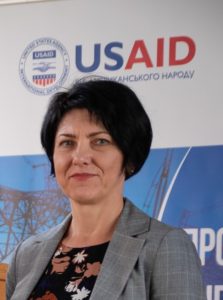On the eve of International Women’s Day, we should remember that the day’s origins were not as a ‘holiday of spring, beauty, and love.’ March 8 began as part of the women’s rights movement, which is in itself part of a larger struggle: the movement for gender equality. Yulia Galustian, Gender Expert of USAID Energy Security Project, helped us to look deeper into it.

What is gender equality?
Quite often people tend to think that gender equality is, firstly, about women’s rights. But this is a misconception. Gender equality means the equal rights of both men and women that society has to ensure in order to provide each individual with equal development opportunities regardless of his/her individual circumstances. Gender equality is one of the key human rights. On March 8, we celebrate the achievements of women across national borders, regardless of ethnic, cultural, economic, and political differences. The idea to celebrate International Women’s Day emerged in the early 20th century when the industrial world was going through expansion and disturbances, a demographic boom, and a rise in radical ideologies. Today, in this trying year, we celebrate achievements in gender equality and diversity, and join efforts in dealing with the global COVID-19 pandemic.
How acute is gender inequality in Ukraine?
When the differences between men and women are caused by inequality of opportunity, then that society is gender unequal. This gender inequality is normally reinforced by some deeply rooted stereotypes. Gender inequality is a problem of every country, wealthy or poor. Ukraine is not an exception. Gender inequality is based on gender roles and gender stereotypes. In Ukraine, men and women are not equal in all spheres. For instance, women are underrepresented in elected bodies at all levels. Women constitute 15-23% of the heads of Consolidated Territorial Communities. Generally, men prevail in all senior management and public administration positions 60/40%. The wage gap is about 20% across all sectors.
This situation is further aggravated by traditional gender roles in the household. Today, under quarantine and lockdown, the burden of unpaid care and housekeeping activities falls primarily on women.
Today one often hears the term ‘gender sensitive company.’ What does it mean?
Gender sensitivity means the acknowledgment of discrimination and an adequate response to discrimination that violates the rights of men and women because of the victim’s gender. Gender sensitivity is an important method of evaluating policies and development, in particular at the company level.
If the policies of a particular company/organization/agency takes into consideration the actual situations of men and women, does not violate their rights, and supports gender balance, you can call it gender sensitive. And we need to remember that the issue of discrimination is far from being resolved in Ukraine. Our society has different expectations of men and women. These differences are something being imposed, and neither men nor women benefit from them. These differences harm society as a whole.
For quite a long time, the energy sector was meant to be ‘a man’s business.’ Why would women go for it?
The energy sector is just a part of the economy, like any other industry. Women constitute less than 30% of the people employed there. It is more or less the same percentage in other countries. The question should be this – what positions do women hold in the energy sector? They are part of the administrative staff or are employed in some of the most unsophisticated jobs. The share of women at the managerial level is less than 15%. This imbalance is the reason for the gender wage gap.
In Ukraine, gender inequality manifests itself in the labor market – women are underrepresented in the STEM professions (i.e. science, technology, engineering, and mathematics). These professions are better paid, associated with economic development, and will be in high demand for the foreseeable future. In addition, the energy sector attracts investors. So there will be more jobs for adequately qualified professionals. Given this, it is vital that young women are allowed to make an informed choice about their future profession.
What is being done in order to encourage women’s involvement in the energy sector and defend their rights?
The number of women in the energy sector is already on the rise, and this is an achievement of the government’s well-balanced affirmative policy. Policies like this need to be introduced at all levels and to be adequately targeted. Do not begin with employment, start earlier with family education and gender culture. In Ukraine, there are too few success stories still, but we do have some. For instance, grantees of the Energy Security Project like CSR Ukraine Center and STAN NGO conducted awareness and education events for young people, in particular young women, with a focus on the energy market, and soft-skills and competency in the energy sector. Every year there are more and more young women interested in these professions, due to new educational programs on energy security and renewable energy, some of which USAID ESP is offering, as well. In addition to this, USAID ESP also supported establishing Gender Committees at the State Company Market Operator and Communal Enterprise KYIVTEPLOENERGO.
